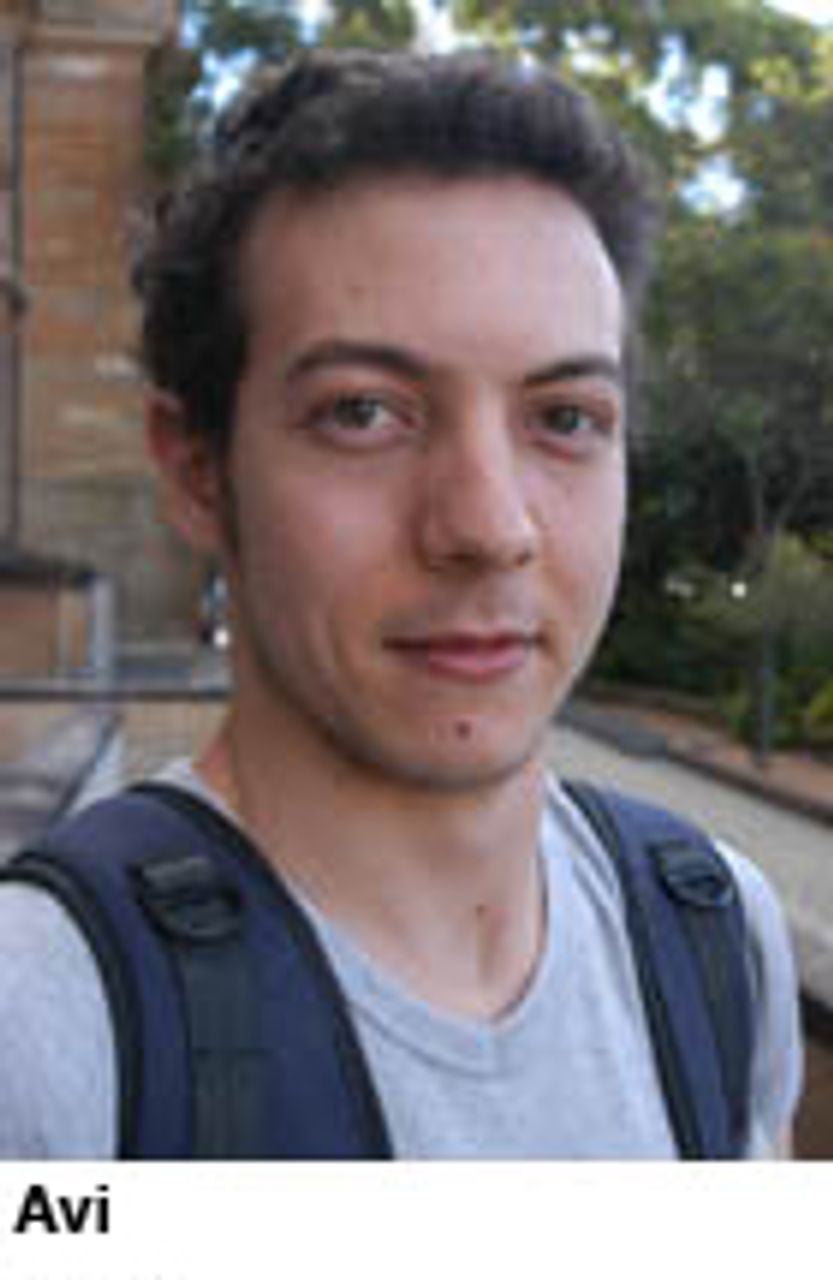After Nick Beams's lectures on "The World Economic Crisis: A Marxist Analysis," WSWS correspondents asked audience members for their impressions and reactions.
Taimur, from Pakistan, who works in the film and TV industry, said he came to the Sydney lecture because he was worried about "where the world on the whole is heading". He said the international integration of the world brought about by globalisation meant that, "if something goes wrong in one part of the world", for example a fall on US stock exchanges, or the recent terror attacks in Bombay, "it affects the entire world". He said, "We're in it together, as a world, rather than as people from different countries" and the financial crisis affected everyone, but mostly "working class people".
Referring to the graphs that Beams used in his presentation, Taimur observed that "where we are heading is scary" and Beams had "shed light on a lot of things people don't really talk about or understand".
Taimur expressed his concern that the economic crisis would lead to an escalation of militarism, by the US in particular. When asked about the SEP's perspective, he said there were "too many stupid things dividing" society, such as "religion, colour, race, all that stuff," which were a product of government efforts to divide the world's population, which had to be overcome.
Jerry, a Chinese engineering student, said he had rote-learned "socialism and communism" for many years in middle school, but these theories had never been put into practice in China. He came to the meeting to "open his mind", and Beams's report was very different from what he had been taught.
Many people in China were deliberately misled by the government into believing that the financial crisis had "nothing to do with them" and was purely a US phenomenon, Jerry said. The Beijing government suppressed the broadcast of actual job-loss figures inside China, but it was clear that "a lot of workers had already lost their jobs," that the economic situation was "not good" and the impact of the financial crisis would be as deep in China as in the US. The government refused to address workers' complaints at losing their jobs, and responded with police violence in industrial areas.
Jerry said he learnt from Beams's lecture why millions of people were losing their jobs, and that the financial crisis was caused by "fundamental defects" in capitalism that "can't be resolved" by the world's governments. The SEP's perspective provided an alternative that could "work very well".
 Avi, a performance studies student from the University of Sydney, had previously read the World Socialist Web Site, finding its art and literature reviews "quite compelling." He found the analysis of the "derivatives markets, options and futures" presented by Beams to be "very enlightening" and was previously unaware of the view that they were a "fundamental necessity of the capitalist system" to attempt to overcome uncertainties and risk in international markets.
Avi, a performance studies student from the University of Sydney, had previously read the World Socialist Web Site, finding its art and literature reviews "quite compelling." He found the analysis of the "derivatives markets, options and futures" presented by Beams to be "very enlightening" and was previously unaware of the view that they were a "fundamental necessity of the capitalist system" to attempt to overcome uncertainties and risk in international markets.
Avi found Beams's presentation "immensely different" to the "diatribe and slogans" of the various radical tendencies, being "clear, objective and comprehensive" which is what made it so compelling. He said he felt motivated to do more reading, and purchased the Historical and International Foundations of the Socialist Equality Party and The World Capitalist Crisis and the Tasks of the Fourth International.
Kathleena Pullan, a psychologist working in the NSW public health system, was attending her first Socialist Equality Party meeting, and was "glad" she came. "The first part of the lecture provided a very thorough theoretical background to how the economic crisis had evolved. I liked the critical analysis of the different financial models, how the capitalist system operates and the growth of financial instruments since the recession of the 1970s.
"However, the second part of the lecture I found more stimulating, basically by highlighting the irrational system of capitalism and putting forward a socialist perspective and how to achieve that. Nick Beams made clear that humanity faces great difficulties if capitalism continues—we are in for another period of mass destruction. There is a lot of information to be absorbed, but the lecture has stimulated my interest."
Asked why she had come to the lecture, Pullan referred to her experiences working in public health. "I work for a government structure that doesn't work. It's part of the system of madness. All the services and infrastructure are under-funded, with not enough people employed on the frontline. That's due to the financial crisis as well. We are seeing more and more people and the system is perpetuating even more mental illness. All we can do is try to apply band-aid solutions, through medications. All the government agencies, like housing and Centrelink, are over-worked and over-stretched and we are not operating effectively like a health system."
 Helen, a third-year commerce-science student at the University of NSW, joined the International Students for Social Equality (ISSE) at the beginning of the year but had not yet attended meetings. She said the lecture provided a great overview of history, time lines and the general workings of capital. It was a great introduction to Marxism.
Helen, a third-year commerce-science student at the University of NSW, joined the International Students for Social Equality (ISSE) at the beginning of the year but had not yet attended meetings. She said the lecture provided a great overview of history, time lines and the general workings of capital. It was a great introduction to Marxism.
"I love the way the lecture looked at history and the reasons why things happen." Speaking of herself, she said: "You look at the world and you think, what is happening? Everything is falling apart. I came to the lecture thinking, what can we do about it? The world is falling apart but there is an answer in socialism. It is optimistic in that sense. You need that when the lecturers at uni are just teaching you about capitalism."
 At the Melbourne lecture, University of Melbourne commerce student Surya said: "The lecture was very interesting. What I heard and understood is really exciting. Before I attended this lecture I asked myself why this crisis had arisen. In my university course, the lecturer just said to us: ‘Do your own research.' I'm still only in first year, but there has been no discussion about the crisis of capitalism.
At the Melbourne lecture, University of Melbourne commerce student Surya said: "The lecture was very interesting. What I heard and understood is really exciting. Before I attended this lecture I asked myself why this crisis had arisen. In my university course, the lecturer just said to us: ‘Do your own research.' I'm still only in first year, but there has been no discussion about the crisis of capitalism.
"This lecture gave me much more of an idea of what factors create the crisis. Beams explained how capital is generated. I'm really a beginner about socialism. Before this, I didn't understand much about history, or the global idea of Marxism. What has been discussed in the universities for a long time is very different from this—the problem is that they think that capitalism is always successful.
"In Indonesia they rarely talk about these things—the media even tries to hide the facts about the rest of the world. But in the last year there has been more discussion. I think it is important to find out more about the global financial crisis—what caused it and how to prevent World War III. I want to learn more about socialism."
Joshua has just finished his after-school "gap year" and will study arts at the University of Melbourne next year. He said: "I thought the lecture was very good, particularly the connections that Nick Beams made between the socio-political and economic factors.
"I came to the lecture out of curiosity. I have been reading a lot about the financial crisis and I wanted to ascertain all view points from all sides of politics. I have not heard a Marxist interpretation of the crisis and I think it is important to provide the working class with a voice. I'm concerned about the scale of the crisis and it seems to me that we have not seen anything like this since 1929. For my generation it is something that we have never seen before—we have not experienced any real economic hardship in our lives but it seems likely we will in the future."
